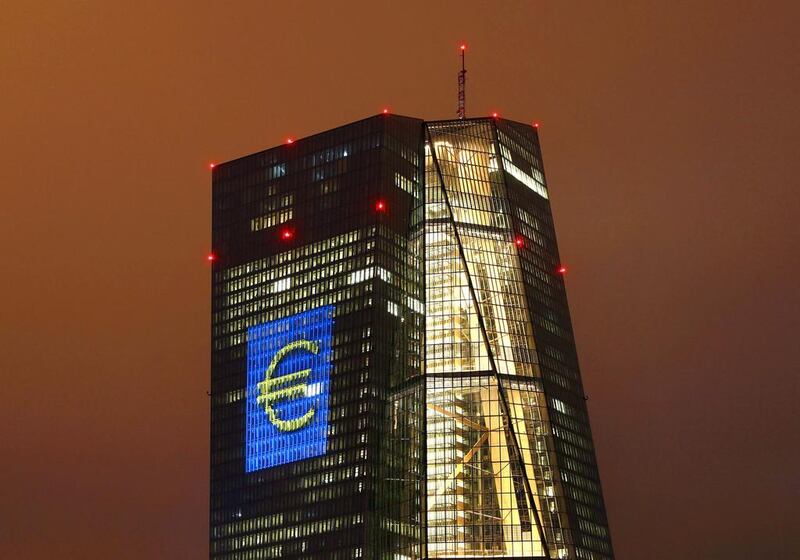Risks are rising within the euro zone and the European Union. According to the European Central Bank, the Brexit referendum and the US election have produced what it calls its “composite indicator of systemic stress”.
In a worst-case scenario, the ECB says, this could reignite the 2009 euro-zone debt crisis.
The bank is worried about political uncertainty within the euro zone, with a constitutional referendum in Italy on December 4 and elections in France and Germany next year.
European politicians seem to worry as well and are vocal about it.
Paolo Gentiloni, the Italian foreign minister, recently said that the EU must provide answers on economic growth and migration if it is to continue as a union. He said: “I think that if Europe is not able to give answers, especially to two main subjects – economic growth and migration … These two issues are so urgent that if there is no European answer, I think that Europe is seriously at risk.”
Italy is set to go the polls to vote on major constitutional reforms and should Matteo Renzi, the pro-EU prime minister, be defeated, Italy could be facing a tenuous political future felt throughout the EU. After Brexit and the election of Donald Trump, a No vote will turn Italy into the latest “anti-establishment” event that will bring greater uncertainty about reforming economies within a widely-defined neoliberal economic model.
Italy has long been the biggest threat to the survival of the euro and the EU. Its GDP per head is trapped at the level of the late 1990s. Its labour market suffers from inflexibility. Its banks are stuffed with non-performing loans. The Italian state is burdened with the second-highest debt load (after Greece’s 182 per cent of GDP) in the euro zone, at 133 per cent of GDP. Unlike Greece, Italy might be too big to bail out.
Yet the challenges facing Italy are part of a larger debate about system rivalry within the EU: loosely defined as state capitalism versus neoliberalism that reverts back about 25 years ago. To deal with these external and, to some degree, internal challenges, the EU needs to be as united as possible, but economic reform is a necessity. However, the economic policies of the old and new EU member states are disuniting.
The southern European states are hesitant to initiate additional reforms as the fiscal tightening has led to deeper economic fiscal multipliers. Although state capitalism hasn’t much helped these southern states, neoliberalism seems unable to offer any quick answers either. None have the means to counter the crisis with spending programmes. Austerity policies may have helped to lower the deficits in these countries’ national budgets. Greece and Italy achieved a so-called primary surplus before paying interest on their old national debts for certain budgetary years. But they have paid a high social and economic price. In Italy, unemployment among young people is at 40 per cent and the economy is barely growing. Greece ranks third – after Cyprus and Spain – in terms of the proportion of young people leaving their home country, prompted by youth unemployment rates approaching 50 per cent.
Moreover, the global economic context is considerably less favourable to those who are trying to reform and tighten the fiscal belt. In a global environment of uncertainty, international investments are less forthcoming to the southern European states. Lack of governance also has a large part to play. And as long the focus remains fixed on fiscal policy and austerity within the EU, the future of the union will become more precarious with the advent of more populist and neoliberal dismissive governments. The 2015 refugee crisis clearly demonstrated the growing dissonance within EU societies.
The German government is prescribing a debilitating austerity policy to southern Europe. Cost-cutting programmes may be unavoidable (for the likes of Italy, Portugal and Greece) once a certain level of debt has been breached, but these have to be matched by necessary measures to improve prospects for the underprivileged classes, especially with the younger generation beginning to see little hope.
Too many Europeans feel that integration is being forced upon them. What’s worse, they may be right. “Europe will be forged in crises,” Jean Monnet (one of the founding fathers of the EU) wrote in 1976, “and will be the sum of the solutions adopted for those crises”. Supporters of European integration talked about creating an unstoppable “chain reaction”. Turning back, even temporarily, would never be an option. The great strength of the euro, as the former German chancellor Helmut Schmidt saw it, was that “nobody can leave it without damaging his own country and his own economy in a severe way”. The chain reaction theory doesn’t seem to be working out in practise, especially of late. Equally, the solutions adopted in recent crises are appearing to divide Europe instead of uniting it. And increasingly there are those who believe that being outside the union might not be as Schmidt said.
The union is facing an impasse. European voters, some European economists note – such as Luigi Guiso, Paola Sapienza and Luigi Zingales – like the euro and want to keep it. At the same time, they don’t like the way current European institutions are managed and they are opposed to the further integration that economists say is needed to make the currency union viable. In other words, European voters don’t want to go forward or backward, and they also don’t want to stay where they are.
The EU has reached a point where it needs to sort out its discord about economic reform and austerity before the vicious circle of debt and stagnation is overridden by populism and disunion. In this environment of uncertainty one thing is certain: the euro over all other major currencies will weaken further in the coming months. Euro-US dollar parity is coming soon and possibly beyond.
business@thenational.ae
Follow The National's Business section on Twitter





